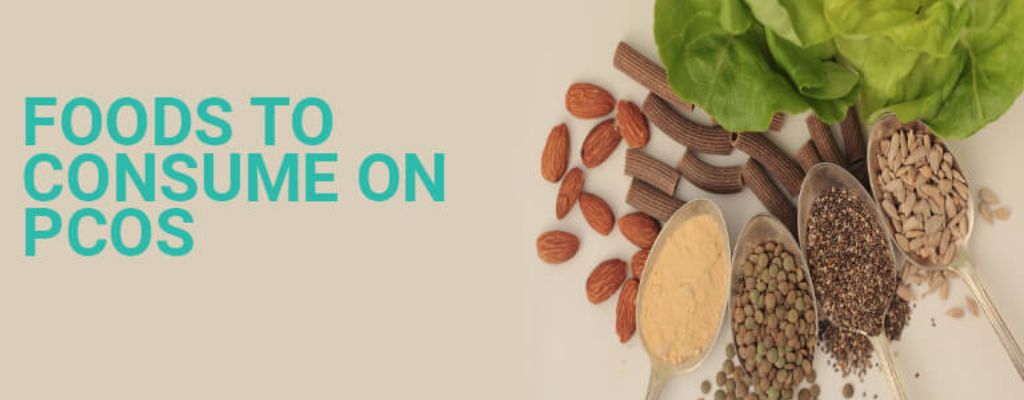PCOS and Nutrition: Adapt Your Diet to Control Your Symptoms
Introduction: Polycystic ovary syndrome (PCOS) is a hormonal disorder that affects millions of women worldwide. While PCOS is commonly associated with irregular periods, ovarian cysts, and infertility, it can also lead to a range of other symptoms, including weight gain, insulin resistance, and hormonal imbalances. Fortunately, research suggests that adopting a healthy diet and lifestyle can help manage PCOS symptoms and improve overall health. In this blog, we’ll explore the link between PCOS and nutrition and provide practical tips for adapting your diet to control your symptoms and support your well-being.

1. Understanding PCOS and Its Impact on Nutrition: PCOS is characterized by hormonal imbalances, insulin resistance, and inflammation, all of which can affect metabolism, appetite regulation, and nutrient absorption. Women with PCOS often experience weight gain, particularly around the abdomen, due to insulin resistance and elevated levels of androgens (male hormones). Additionally, insulin resistance can lead to high blood sugar levels, which may increase the risk of type 2 diabetes and other metabolic disorders. Therefore, adopting a balanced and nutritious diet is essential for managing PCOS symptoms and reducing the risk of complications.
2. Focus on Complex Carbohydrates: Carbohydrates play a crucial role in PCOS management, as they can affect insulin levels and blood sugar control. Instead of simple carbohydrates like white bread, sugary snacks, and refined grains, focus on complex carbohydrates that are rich in fiber and nutrients. Opt for whole grains like brown rice, quinoa, oats, and whole wheat bread, which provide sustained energy and help stabilize blood sugar levels. Incorporating plenty of fruits, vegetables, legumes, and lentils into your diet can also provide essential vitamins, minerals, and antioxidants to support overall health and well-being.
3. Choose Lean Protein Sources: Protein is an important nutrient for women with PCOS, as it helps regulate appetite, support muscle growth and repair, and stabilize blood sugar levels. Choose lean protein sources like poultry, fish, eggs, tofu, tempeh, and legumes, which are low in saturated fat and high in essential amino acids. Incorporating protein into each meal and snack can help keep you feeling full and satisfied, reducing the risk of overeating and promoting weight management. Additionally, including protein-rich foods in your diet can help regulate insulin levels and improve insulin sensitivity, which is beneficial for women with PCOS.
4. Incorporate Healthy Fats: Healthy fats are an essential part of a balanced diet and can play a role in managing PCOS symptoms. Opt for sources of unsaturated fats like avocados, nuts, seeds, olive oil, and fatty fish, which provide heart-healthy omega-3 fatty acids and other essential nutrients. Including healthy fats in your diet can help reduce inflammation, support hormone production, and improve insulin sensitivity. However, it’s important to consume fats in moderation and avoid excessive intake of saturated and trans fats, which may contribute to weight gain and increase the risk of cardiovascular disease.
5. Balance Your Plate: When planning meals, aim to create balanced and satisfying meals that include a combination of carbohydrates, protein, and healthy fats. Fill half of your plate with non-starchy vegetables like leafy greens, broccoli, cauliflower, and bell peppers, which provide essential vitamins, minerals, and fiber. Reserve a quarter of your plate for lean protein sources like chicken, fish, tofu, or beans, and the remaining quarter for complex carbohydrates like whole grains or starchy vegetables. Balancing your plate in this way can help regulate blood sugar levels, control appetite, and promote overall health and well-being.

Conclusion: In conclusion, adopting a healthy and balanced diet is essential for managing PCOS symptoms and supporting overall health and well-being. By focusing on complex carbohydrates, lean protein sources, healthy fats, and balanced meals, you can stabilize blood sugar levels, improve insulin sensitivity, and reduce inflammation associated with PCOS. Additionally, incorporating regular physical activity, managing stress, and getting adequate sleep are important components of a healthy lifestyle for women with PCOS. Remember to consult with a healthcare professional or registered dietitian to create a personalized nutrition plan that meets your individual needs and goals. With the right diet and lifestyle modifications, you can take control of your PCOS symptoms and improve your quality of life.




